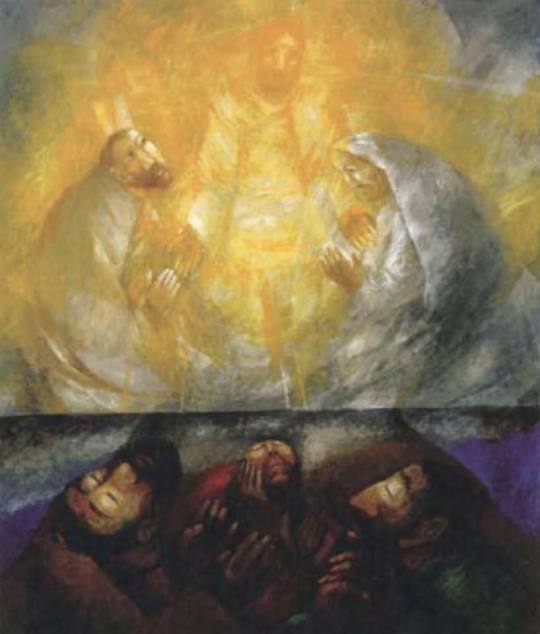
The Adulterous Woman at Jesus’ feet (Andrey Mironov )
5th Sunday of Lent C
Readings Isaiah 43:16‑21 Philippians 3:8‑14 John 8:1‑11
As we make a sincere effort to turn from sin during the Lenten season, God's grace offers undreamt possibilities for new life. In today's readings Second Isaiah, Paul, and Jesus speak of new beginnings for those once trapped in sin or self-righteousness. Let us celebrate the new life beyond sin in the words of the responsorial psalm: "The Lord has done great things for us;/ we are filled with joy" (Ps 126).
In the first reading Second Isaiah announces that the Lord is about to lead the Jewish exiles home from Babylon in a magnificent new exodus. The same Lord who opened a way in the sea and "snuffed out" the Pharaoh's "chariots and horsemen" will now liberate the exiles from the mighty power of Babylon. In fact, the exiles are commanded to forget the wonders of the past, so magnificent will this “new thing" be. "Remember not the events of the past,/ the things of long ago consider not;/ See, I am doing something new!/ Now it springs forth, do you not perceive it?" This new deed includes a wondrous journey home through the wilderness filled with life-giving waters. All is done so that the Israelites may witness to the Lord by announcing his praise, the very thing they do in the verses of the responsorial psalm. “When the Lord delivered Zion from bondage,/ it seemed like a dream. Then was our mouth filled with laughter,/ on our lips there were songs.” (Ps 126:1‑2)
In the Epistle Paul testifies to the Philippians, who were tempted to adopt a righteousness based on the observance of the Jewish law, that he himself has forfeited such righteousness and accounts it as "rubbish" in comparison to the justice which comes through faith in Christ. In contrast to the old human righteousness which rests on our paltry observance of the law and inevitably leads to self-righteousness, this new righteousness "has its origin in God and is based on faith." It involves "knowing Christ" by sharing in the pattern of his suffering and death, but also being strengthened by "the power flowing from his resurrection." This righteousness through faith in what God has done in Christ gives the believer a hope which Paul describes as a runner straining for the finish line. Because he has been freed from the burden of the past and "grasped by Christ," he can say: "I run toward the prize to which God calls me‑‑ life on high in Christ Jesus."
The Gospel selection from John also shows Jesus offering a new life that transcends self- righteousness centered on the law. Using a woman caught in the act of adultery, the scribes and Pharisees attempt to trap Jesus into condemning her to be stoned, something mandated by Jewish law (see Lev 20:10; Deut 22:23‑24), but forbidden by the Romans, who according to John did not allow the Jews to carry out the death penalty in cases where their law required it (see John 18:31). At first, Jesus delays by simply bending down and tracing on the ground with his finger. When the scribes and Pharisees persist in asking Jesus to render a judgment on the case, he challenges them with the words: “Let the man among you who has no sin be the first to cast a stone at her.” Confronted by their own sins, the crowd drifts away, beginning with the elders.
Jesus then offers the woman, who had simply been a legal case example for the elders, a new lease on life. Suddenly alone with Jesus, she appears superior to her accusers in that she has not condemned another. Jesus simply asks, “Woman, where did they all disappear to? Has not one condemned you?” When she humbly replies, “No one, sir,” Jesus sends her on her way with an assurance of forgiveness and a command to turn from sin and begin life anew. "Nor do I condemn you. You may go. But from now on, avoid this sin." Our Lenten observance is moving toward its goal when we act on these same words.

 3rd
3rd